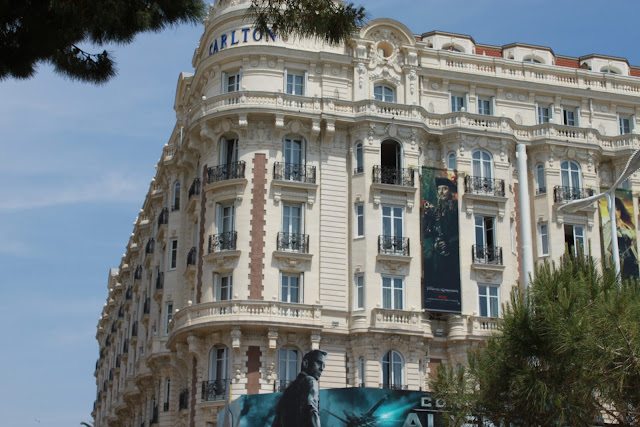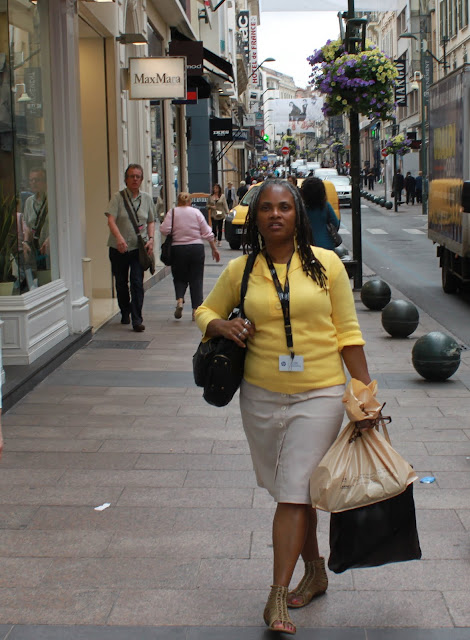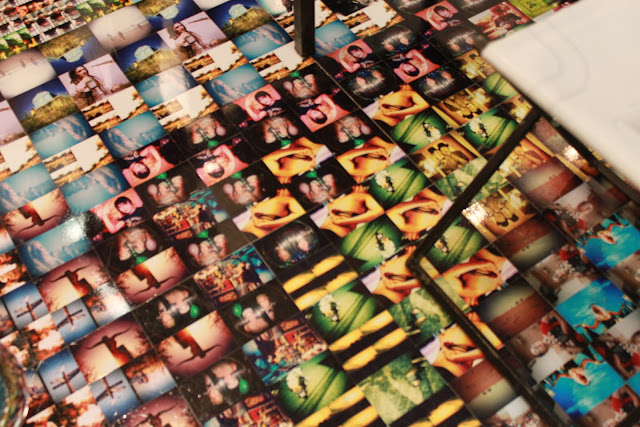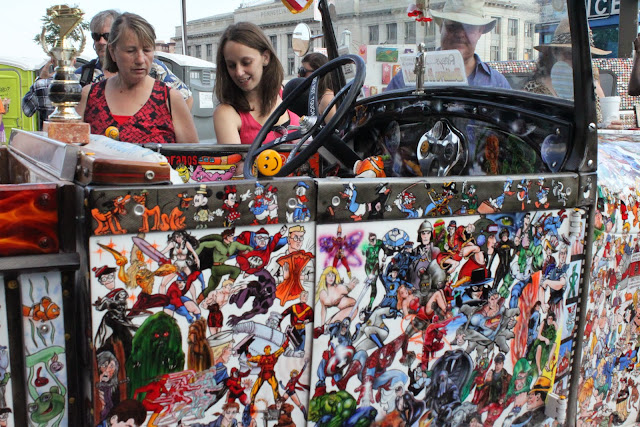Photos by Titilayo Akanke (except where pictured)
 |
The very first day as Creative Minds in Cannes participants gather in front of Villa Maupaussant, (our place of residence) to prepare for
a walking tour of Cannes, France and learn how the festival operates.
|
The Cannes Film Festival, one of the world's oldest and most prestigious, is an international marketplace where people from around the globe conduct business in various aspects of the film industry. From 8:00 AM until after midnight, hundreds of movies are screened daily at theatres all over the city, by producers, distributors, buyers, the press, talent agencies, celebrities, and film lovers.
Potential viewers are allowed into venues based on levels of festival accreditation evidenced in badges which must be purchased upon registering, and presented at each screening and other festival activities. The Marche badge is held primarily by buyers, and it allows them first and unlimited access to each event. The press and special passes are given next consideration, then the general festival accreditation badge, and finally the Cinephile Badge, which offers limited access. The general festival accreditation identification provides unlimited access to activities, but entrance is not always guaranteed for smaller venues once the others who given first priority are allowed entrance. Attending the Cannes Film Festival without a badge is unproductive as access to most activities, including screenings, will be denied.
As an intern, I am working for International Creative Management (ICM), one of the world's largest talent and literary agencies. The company has offices in Los Angeles, New York and London, and has been in existence for more than thirty years. Under the direction of chairman and CEO, Jeffrey Berg, and president, Chris Silberman, the company represents clients in film, television, music, publishing, theatre, and more.
 |
| The Carlton Hotel, Cannes headquarters for ICM. |
Daily, I report to the Jeffrey Berg Suite (renamed last week) of the Carlton to receive my assignments for the day from David Gonzales, assistant to the CEO, and supervisor for interns.
 |
| View of Le Croisette, lined with palm trees, and the Mediterranean Sea in the background. |
 |
| View of the Riviera from the balcony of the Carlton. |
 |
Early morning in front of The Palais, the main building with several
large theatres, and headquarters for the festival, before activities begin. |
 |
| Titilayo Picking up tickets at the Palais for ICM |
My job is to run errands, assist in the office, source tickets, and provide coverage for films. The errands have primarily been shopping for refreshments for meetings scheduled every thirty minutes with Berg and his team, or for supplies for the office. Sourcing tickets means sometimes picking them up from the festival office, production companies, or agencies and delivering them to the ICM office, clients, or staff. I have walked a great deal of the city, particularly the area surrounding the Palais, the building housing festival offices, and the larger theatres where nightly premiers are held.
 |
Titilayo running errands, picking up items from the
Monoprix department store and Fnac electronic store. |

 |
The Monoprix and Fnac are daily errands. The Monoprix is equivalent
to Target, and Fnac is an electronic store, similar to Radio Shack. |
Providing film coverage requires me to watch a movie and write a critique. Based on the assessment of the person providing coverage and analysis, ICM team members may be influenced as to whether they will watch the film themselves to make decisions about investments, distribution deals, and other matters. The ramifications of this task is daunting. My opinion about a film could possibly be the catalyst that propels some one's career forward or destroys their dreams. Based on my expertise as a screenwriter and my experience as a film lover who has a good understanding of what makes a good product, I have also offered sincere and hopefully constructive comments on the films I have screened thus far. Those include
Volcano, The Fairy, and
My Last Valentine in Beirut. (Coverage of my screenings will appear in upcoming blogs and will include more films).
My visit to France has been productive and has helped me gain an even greater understanding of the film industry, but it has also provided an opportunity to travel abroad again, which is perhaps the best way to gain understanding of the language and culture of other ethnic groups and countries. In that regard, I have made some observations about the French. When they greet, they really do kiss each other on both cheeks (just like in the movies). They love their pets, particularly small dogs, and they take them everywhere, even to markets and restaurants. At a cafe last week, a gentleman poured water from his glass into a small (clean) ashtray and held it for his dog while the tiny animal lapped it up. It is not uncommon to see pet owners pushing their animals around in baby strollers. The French drink wine for breakfast, lunch, and of course, dinner. Attitudes about the human body are liberal, and nudity (or partial nudity) is an acceptable aspect of the culture. Exposed breast on the beach and on posters throughout the city are common and without stigma. There are street musicians playing what seems to be traditional French music.

Street violinist playing French music.
 |
| View from the balcony of the Villa Maupaussant, home for Creative Minds participants. |
 |
| Artwork on the side of a building depicting French life. |
 |
| The Olympia Theatre |
 |
The Star and Olympia Theatres also showcase films though
they are located away from the main festival area. |
 |
Cafes are the norm in Cannes. Most (if not all) restaurants offer outdoor dining.
On most, the whole front of the building is a large sliding door
that allows patrons and passers-by to see inside the restaurant.
|
 |
| Media coverage of festival activities and celebrity appearances is constant. |
![]() |
Reception on the Terrace of "The College" before the premiere
of the short films by Creative Minds film producers. |
 |
Reception on the terrace of "The College," before the premier
showcasing of the work of Creative Minds filmmakers
![]() |
Howard University students gather for a photo during the reception on the terrace
of "The College" before the premier of short films by Creative Minds producers. |
|
 |
| Audience during the Creative Minds filmmakers premier. |
 |
Premier night for Creative Minds filmmakers.
 |
Producer, director and founder of Creative Minds, Rob Ford,
addresses the audience during the filmmakers premier evening. |
|
 |
| Scenic view from the Belles Rives Restaurant on the Riviera. |
 |
Lunch at the Belles Rives Restaurant on the Riviera with
David Gonzales (front right) ICM staff in charge of interns.
 |
Lunch at the Belles Rives on the Riviera.
Lunch at the Belle Rives Restaurant.
|
|
 |
Marriott Employees striking for better wages.

Marriott employees striking. |
Marriott employees demonstrate in front of the Marriott Hotel on Le Croisette. According to driver, Samir Touam, who is not a Marriott employee, the staff was striking because of poor wages. "A lot of money is made during the festival, but the workers see none of it. It's all for the bosses," he says. The work stoppage lasted only one day. It is not clear how issues were resolved.
 |
| Large outdoor television screen showcasing activities on the red carpet. |
 |
People gather in front of The Palais during premiers to watch
activities on the red carpet on the large outdoor screen.
 |
| The floor of one of the vendors inside The Palais |
|
 |
A poster collage featuring images from various
movies debuting during the festival. |
![]() |
| Creative Minds gentlement out in the evening for a premiere. |
Attending the Cannes Film Festival is an extraordinary journey and learning experience. It is an opportunity to enjoy the beautiful city of Cannes, to experience the hospitality of the French, to network, and learn more about the powerful and artistic medium of expression and communication that we call film.













































































